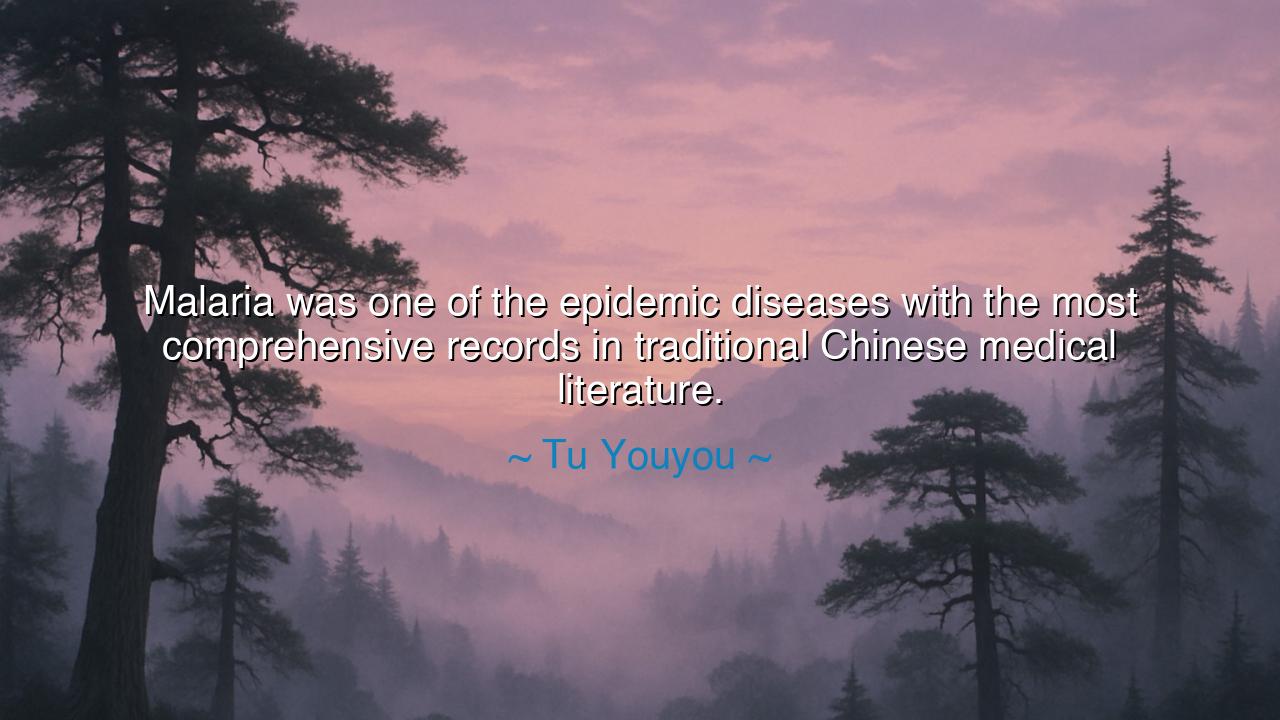
Malaria was one of the epidemic diseases with the most
Malaria was one of the epidemic diseases with the most comprehensive records in traditional Chinese medical literature.






The words of Tu Youyou—“Malaria was one of the epidemic diseases with the most comprehensive records in traditional Chinese medical literature.”—shine like a bridge between the wisdom of the ancients and the discoveries of the modern age. They remind us that human suffering, though often thought of as new, has been witnessed and recorded for centuries. In those old scrolls and prescriptions lies not mere folklore, but the painstaking memory of countless healers who faced the terrors of malaria, seeking in roots, herbs, and observation the keys to life.
At the heart of Tu Youyou’s reflection lies the idea that the past speaks to the present. While modern science may clothe itself in the language of laboratories and clinical trials, it was the curiosity of ancient physicians, faithfully recording symptoms and remedies, that preserved the clues which later generations could rediscover. For malaria, this was especially true: through the writings of traditional Chinese medicine, the path was kept open for the discovery of artemisinin, the drug that would save millions. Without those ancient records, the chain of wisdom might have been broken.
The ancients always revered memory. In Egypt, papyrus scrolls described diseases and their treatments. In Greece, Hippocrates catalogued fevers, epidemics, and their remedies, knowing that the written word outlives the healer’s hand. In China, the medical classics such as the Zhouhou Beiji Fang preserved remedies for centuries. Tu Youyou’s triumph in extracting artemisinin was not the invention of something new from nothing, but the fruit of centuries of patient memory, recorded by those who came before. It is a reminder that history itself can be a healer.
One need only look at Tu Youyou’s own story to see this truth come alive. During the Cultural Revolution, when resources were scarce and modern science seemed paralyzed, she turned to the ancient texts, reading by candlelight, searching for forgotten wisdom. From the lines of a prescription written hundreds of years before, she found a reference to sweet wormwood (qinghao) as a treatment for fevers. By following this thread, she uncovered the secret that would lead to the modern malaria cure. The old literature became not a relic, but a weapon against death.
The emotional weight of her words lies in their reverence for the continuity of knowledge. Too often, the wisdom of the past is dismissed as superstition. Yet Tu Youyou shows that even imperfect records hold within them seeds of truth. What one age observes without fully understanding, another age may illuminate with new tools. Thus, the writings of traditional Chinese medicine were not obsolete—they were waiting, patient as stone, until the day their hidden treasures could be revealed.
The lesson for us is profound: never despise the knowledge of those who came before. Instead, honor it, preserve it, and return to it with humility. This applies not only to medicine, but to every field of human endeavor. For the struggles of our ancestors mirror our own, and in their words may lie forgotten answers to our most pressing challenges. Practically, this means valuing history, recording our own struggles faithfully, and building upon the foundations laid by others rather than casting them aside.
Thus, Tu Youyou’s quote becomes not only a tribute to medical literature, but a parable of human progress itself. Malaria, the ancient enemy, was confronted by ancient wisdom and modern science working as one. The recorders of the past and the seekers of the present clasped hands across centuries to defeat a plague. Let future generations learn from this: that in every old book, in every tradition, there may lie a key to tomorrow’s salvation. For knowledge, once preserved, is never wasted, and the wisdom of the ages is the truest inheritance of humankind.






AAdministratorAdministrator
Welcome, honored guests. Please leave a comment, we will respond soon